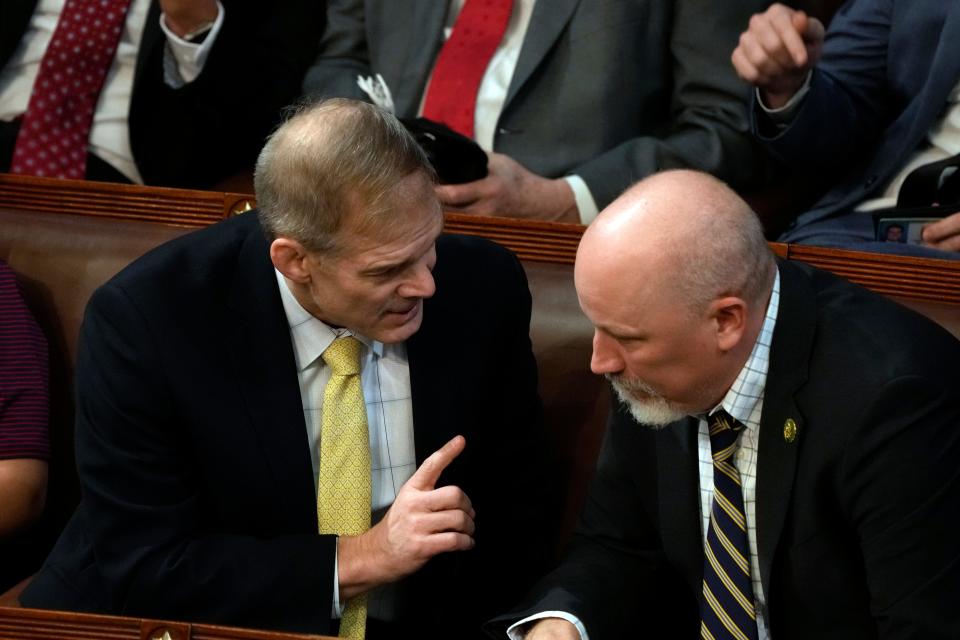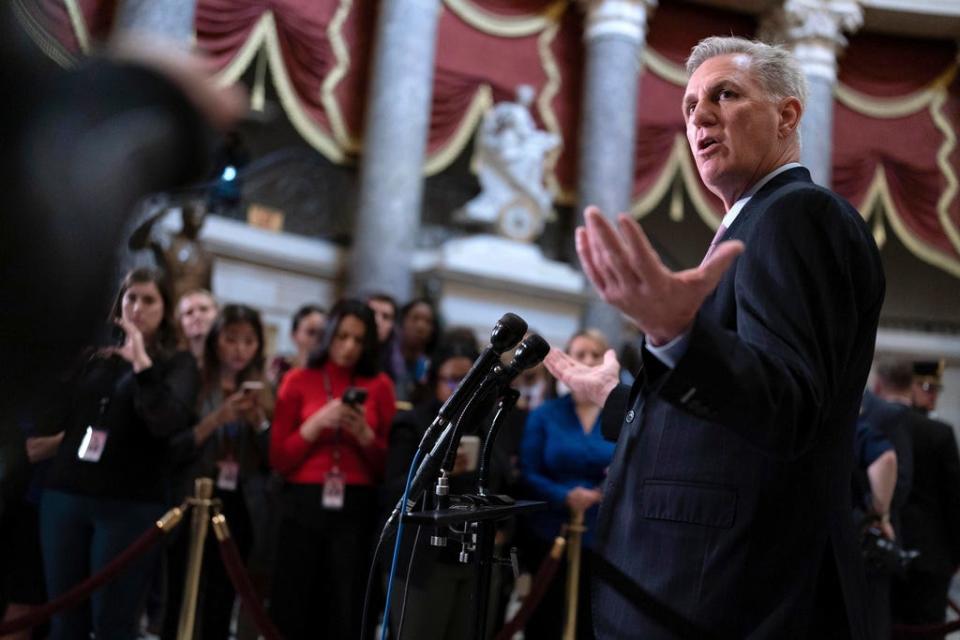From probe target to political heavyweight: Pa. Congressman Perry flexes new clout in D.C.
For the past two years, U.S. Rep. Scott Perry (R-Pa.) has been under question for efforts to overturn the 2020 election.
As chair of the resurgent Freedom Caucus, however, he's stepped out of the 2022 midterms as a leading figure of the new House Republican majority. And it's clear that he and fellow allies of former U.S. President Donald Trump will be doing some asking of their own moving forward.
"Honored to be on the House Oversight Committee — boy do I have some questions," he tweeted Tuesday night in announcing his appointment to the powerful committee with subpoena power.
Honored to be on the House Oversight Committee — boy do I have some questions.
— RepScottPerry (@RepScottPerry) January 18, 2023
Put in context: Less than a year ago, the FBI seized Perry's phone. Now Perry and other Trump supporters have seized control of congressional rules and are set to begin "investigating the investigators."
In an interview with the USA TODAY Network, the controversial congressman explained his positions and what he expects from the 118th Congress after his party took control with a narrow and fractured majority. He discussed the dramatic and drawn-out negotiations that made Kevin McCarthy the speaker of the House, his vision for tightening federal finances, where he stands on aid to Ukraine and whether McCarthy is on a short leash.
How did the Freedom Caucus gain influence?
Perry was among 20 GOP members of Congress who blocked McCarthy's nomination as speaker of the House more than a dozen times over four days earlier this month. McCarthy was finally appointed speaker after he agreed to terms more amendable to the hardline conservatives in Perry's caucus.
Members of the Freedom Caucus say these rule changes will benefit Americans with increasing accountability and transparency by:
Allowing amendments to cut spending in appropriations bills by eliminating programs or shedding salaries.
Requiring bill texts to be released at least 72 hours before a floor vote.
Increasing accountability by allowing a single House member the ability to vacate the speaker. It’s a move that gives more power to the rank-and-file members that dates back to Thomas Jefferson, U.S. Rep. Chip Roy said.
Limiting bills to a single subject.

According to Perry, requiring bills to cover a single topic was an important one. It means lawmakers no longer have to justify voting for 4,000-page measures encumbered with bloated and unnecessary spending.
"No one likes that," he said. "The American people don't like that."
"Unfortunately, there was a lot of resistance to change."
Jennie Sweet-Cushman, an associate professor of political science at Chatham University in Pittsburgh, said she understands the reasoning behind some of the maneuvers. She just has reservations about how it will be efficient enough to keep government functional.
"(That's) actually how it's supposed to work," Sweet-Cushman said.
"I get what the Republicans are trying to do here. It's better governance for sure. It's just not practical."
Perry acknowledged the challenges of doing business this way, but said it will be worthwhile if it helps Congress reduce government spending and the average cost of living.
"The whole thing is about supporting and helping the little guy in America today," he said. "Inflation's a huge issue. Energy's an issue for people who cant afford to heat their homes."
"There's a lot to do."
This includes efforts to "end the weaponization of the federal government against the People" through an investigation of law enforcement and national security agencies over alleged bias against conservatives. It's this initiative in particular that has grabbed the attention of critics who characterize the impending probe as an obstruction of justice.
What is the Subcommittee on the Weaponization of the Federal Government?
Last week, a party-line vote allowed House Republicans to establish the Select Subcommittee on the Weaponization of the Federal Government that could conduct inquiries of:
The investigation of Trump’s efforts to overturn the 2020 election.
The investigation of classified documents found during a search of Trump's Mar-a-Lago estate.
Alleged Big Tech censorship from social media companies such as Twitter and Facebook.
The Education Department’s relationship with local school boards.
A proposed "disinformation board" at the Department of Homeland Security.
Heading the panel is U.S. Rep. Jim Jordan (R-Ohio), a Trump ally who visited the office of former Pennsylvania Speaker of the House Bryan Cutler with Perry in the days following the 2020 election. Cutler has testified that Jordan and Perry were asking him about potential legal options for Trump, who was seeking to overturn the electoral victory of current President Joe Biden.

Perry's involvement with the Trump White House during this period put him under the microscope of the now-defunct House Select Committee to Investigate the Jan. 6 Attack.
After Perry declined to cooperate with the committee, objecting to testimony requests and declining to appear before its members before their June 11 deadline, his cellphone was seized Aug. 9 by the FBI.
Members of the committee ultimately issued ethics violation referrals for Perry, Jordan and two other congressmen. It's unclear whether those referrals will result in sanctions against those officials, and the FBI does not comment on pending criminal investigations.
Facts First USA — an organization headed by Media Matters for America founder and Democratic activist David Brock — has blasted the weaponization of the federal government subcommittee as fruit of a "corrupt bargain" between Republican hard-liners and McCarthy.
First, he said, it demonstrates a total disinterest in governing and tackling important problems. Secondly, he added, it could give subpoena power to the very officials being investigated for Jan. 6 and efforts to overturn the 2020 election.
"What we're looking at is a cover-up in process of their own involvement in Donald Trump's crimes," Brock said in an interview with the USA TODAY Network. "(Perry's) been tied to the insurrection. They're potentially empowering him as an investigator on one of these committees."
"It's very dangerous to be trying to destroy the FBI."
Perry, meanwhile, has long maintained that he did nothing illegal in his support for Trump. He's characterized the seizure of his cellphone as "banana republic tactics" and his spokesman, Jay Ostrich, has essentially laughed off the ethics referral.
“More games from a petulant and soon-to-be defunct kangaroo court desperate for revenge and struggling to get out from under the weight of its own irrelevancy," Ostrich said in December.
In response to his cellphone seizure, Perry filed suit against the U.S. Department of Justice requesting that his phone data be returned and asked for a temporary restraining order to keep the department from searching the data until the judge rules in this motion. He soon after dropped this suit.
The York Daily Record, PennLive and The York Dispatch have also asked — to no avail, thus far — for the United States District Court for the Middle District in Harrisburg to unseal the warrant and related documents used to seize that phone.
Fellow Republican and former U.S. Rep. Liz Cheney has suggested that Perry and other Trump allies sought presidential pardons after the Capitol riot. A Perry spokesperson called this a "ludicrous and soulless lie."
Posting to Twitter on Jan. 8, Perry shrugged at whether his efforts to start "investigating the investigators" would present a potential conflict of interest.
"The assertion that I should sit out the fight to investigate and hold accountable those who created the Weaponization of The Federal Government (WTFG) is ludicrous," he wrote. "I will NEVER quit fighting - no matter what's thrown at me."
The assertion that I should sit out the fight to investigate and hold accountable those who created the Weaponization of The Federal Government (WTFG) is ludicrous. I will NEVER quit fighting - no matter what’s thrown at me. #WTFG
— RepScottPerry (@RepScottPerry) January 8, 2023
What's next for the 118th Congress?
To outsiders such as Sweet-Cushman, the current legislative session will be, if nothing else, fascinating.
Members of the Freedom Caucus, she said, could make fiscal responsibility a plank of the GOP again. She expects protracted fights about appropriations and the debt ceiling. There's already a standoff between lawmakers over raising the debt ceiling to allow America pay its bills, raising questions of whether the House GOP's positions on spending could mean deep budget cuts.
"Amendments and nitpicking will make (governing) more difficult," she said.
"I cannot fathom how they're going to get these budgets passed. I just can't fathom it."
On the political dynamics within the House GOP, Brock said the concessions McCarthy made to become speaker rendered him "impotent" to far-right members who want to "extort" him.
"I think that's a recipe for total unpredictability and instability," Brock said. "I think they've created chaos for the next two years."
Sweet-Cushman also wondered whether McCarthy will sit as speaker for long before the first representative calls for his removal.
"If they (do) that, this is going to be the most insane Congress ever," Sweet-Cushman said, "and that's an understatement. Think about the personalities in the Republican caucus right now."

Perry, for his part, remains noncommittal.
"We're not anticipating, and certainly not interested in, using that accountability measure," he said of a possible vote to oust McCarthy. "I think we're very close to being on the same page. (But) you never want to rule that out."
So as political observers look for potential shutdowns and infighting, Perry holds a few more cards than he held a year ago.
As CNN reported in 2021, he was originally overlooked as chair of the Freedom Caucus because his district was deemed too competitive. He'd won reelection in 2020 by less than 7 points.
Last year — despite the federal investigation and just a 5-point GOP-to-Democrat edge in his district — he defeated his challenger by 8 points.
With his newfound clout in the 118th Congress and a full year under his belt as the Freedom Caucus chair, Perry may be punching above his weight for a congressman from rural Pennsylvania. But he doesn't seem squeamish about his legal and political fights, past, present or future.
For instance, Perry said he believes everyone in his district and across the country disagrees with Russian President Vladimir Putin's invasion of Ukraine. But that doesn't mean he would favor unconditional support for Ukraine when the U.S. hasn't secured even its own borders.
"Is there a limit to Amercia's involvement, financially or otherwise, and is there accountability for that spending?" the retired assistant adjutant general of the Pennsylvania Army National Guard asked.
"That doesn't sit right. It doesn't sit well with a lot of Americans who have to balance their own budgets."
Bruce Siwy is a reporter for the USA TODAY Network's Pennsylvania state capital bureau. He can be reached at bsiwy@gannett.com or on Twitter at @BruceSiwy.
This article originally appeared on USA TODAY: How U.S. Rep. Scott Perry, Freedom Caucus is impacting Congress


